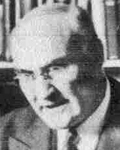|
* *
*
One of the characteristics of the present era is that it is imbued with
what is called the scientific spirit. The word science comes from the
Latin word which means "to know." Science, then, according to definition,
is that which is known. In order to know anything properly, a person must
have all the facts that pertain to the subject in hand. He must not only
gather the facts, but must correlate his data, and place it in proper
relation in its environment.
If a person, therefore, is endeavoring to study any passage or text in a
scientific manner, he must gather all the facts that bear upon the subject
of the special passage, must relate them to kindred thoughts, and give
them their proper place in the scheme of things. I might illustrate this
process by the use of the jigsaw puzzle. The component parts are laid out
for one to use in reconstructing or building all the pieces into a
complete unit. When each single part is placed in its proper position with
relation to others without being forced, a picture or map is thus
constructed - figuratively speaking, a mosaic is formed, which presents
some pattern or scene.
Again, the principle which we have under consideration may be compared to
the work of a lawyer on a given case. He seeks all the information and the
data that has any bearing upon the situation. The facts and material
evidence, if there be any, are presented in the proper relation to other
things. In the case of a trial by jury, these facts are presented by the
witnesses and are summed up by the legal advisers on both sides. Then it
is for the jury to decide the case upon the merits of the evidence.
In a similar way, when anyone is studying any particular subject in the
Scriptures, he must examine carefully the testimony of each of the
biblical writers on the subject to be investigated. The testimony of each
passage must be related properly to the theme in hand in order that a
clear picture may be presented by all of those giving their testimony.
SOME FUNDAMENTAL PRINCIPLES INVOLVED
In order to gather all facts on a given subject - if a person wishes to
get a complete and a clear picture of a subject - he should have a good
concordance; but should know how to use it. Of course, the references in a
good reference Bible are often of great advantage to the student. At the
same time, many of these references are incorrect, since they have been
placed there by men, fallible creatures who do make mistakes. A person
must study each scripture to which a reference is made in order to
determine whether or not the particular passage referred to has any
bearing upon the theme under investigation. The facts of each context
alone can decide this matter.
A very grave error is frequently made by considering a verse as being
related to a given one because of the same words in both passages. For
instance in Genesis 1:2 we see the words, waste
and void, which describe the condition of the earth after it
had been wrecked. In Jeremiah 4:23 we also see these same words. Many have
concluded, therefore, that Jeremiah was looking backward to the same
original catastrophe that overtook the primitive earth. Whenever such an
interpretation as this is made, error instantly is injected into the
subject. When the context of the passage of Jeremiah 4:23 is studied, it
becomes immediately evident that this passage is referring to the great
Tribulation, when wreckage and devastation will he the order of the day on
account of the terrific judgments which the Lord will send upon the earth.
Again, we see mention made of the new heavens and the new earth in Isaiah
65:17. By looking at and studying carefully II Peter 3:1-13, we find
reference to the new heavens and the new earth. By our studying each of
these passages and getting the facts in each context, we see that both
Isaiah and Peter were talking about the new heavens and the new earth of
the Millennial Era. But in Revelation, chapters 21 and 22, we also read of
new heavens and a new earth. When a person studies the chronological
development of the prophecies of the Book of Revelation, he sees that the
new heavens and earth of these chapters are those which will be created
after the Millennium has ended. To identify therefore the new heavens of
Isaiah 65:17 and II Peter 3:13 with the new heaven of Revelation, chapters
21 and 22, is a false identification. Whenever these are thus considered
the same confusion is immediately introduced into the Scriptures.
Whenever a person studies the Scriptures by comparing one passage with
another, he assumes that all truth harmonizes. Since the Bible is the
inerrantly inspired Word of God, all of its statements must harmonize.
Should there appear to be, on the surface, a contradiction, let us
conclude that the discrepancy is only apparent and not real. Any such
variance is to be accounted for upon the basis of our lack of knowledge or
comprehension to understand the real situation which appears as
inharmonious. Truth and facts, whether in the physical, material universe,
or in revelation, are in perfect accord. The God who created the universe
likewise made the revelation that is contained in the Scriptures. He being
the God of reality, stamps truth on His material universe and states it in
His Word.
It is of paramount importance that, whenever we attempt to compare
scripture with scripture, we must be certain that the passages under
consideration are indeed talking of the same things, persons, or events.
Sometimes, upon the surface, there appears to be a connection between two
passages. But when all the facts of the context of each passage are
studied carefully, it frequently becomes evident that those passages that
are supposed to be related are not. On the other hand, often there are
passages that have bearing upon other quotations, which at a glance we do
not immediately recognize. But let it be understood that the facts of the
context of all passages must be thoroughly studied before any
identification may be made.
We must understand that the fullness, completeness, and the clarity of a
picture that is made by comparing scripture with scripture, depend upon
the thorough and complete investigation that is made. If only a few
passages that have bearing upon a subject are studied and considered, of
course the picture or conclusion to which one is brought is only partial,
limited, and incomplete. On the other hand if all related passages are
studied in the light of the context of each and the facts thus gleaned are
placed in the proper relationship with the others that are gathered from
different passages, and if a thorough induction is made, then we have a
complete and clear picture of the subject under consideration - we have
all the truth that God has revealed on a given subject.
AN EXAMPLE OF COMPARING SCRIPTURE WITH
SCRIPTURE
In the beginning God created the heavens and
the earth (Gen. 1:1). The first statement of the Scriptures in
the original Hebrew contains seven words. This declaration has mighty and
far-reaching ramifications. In fact, volumes are wrapped up in this
sublime utterance. By a clear, full understanding of this passage, most of
the philosophies and cults may be refuted.
In the Beginning
In the beginning. . . .
This phrase immediately suggests that found in John 1:1:
In the beginning was the Word. ...
The Word, the Living Word, existed in the beginning, that
portion of eternity that antedated the creation of the material universe.
Likewise reference is made to this same Living Word who is thought of as
Wisdom, in Proverbs 8:22f: 22 Jehovah possessed
me in the beginning of his way, Before his works of old. 23 I was set up
from everlasting from the beginning, Before the earth was. 30 Then I was
by him, as a master workman; And I was daily his delight, Rejoicing always
before him, 31 Rejoicing in his habitable earth; And my delight was with
the sons of men.
In such a passage as Isaiah 44:6 we have a reference to God and His being
back in the beginning, in the eternity of the past, as well as existing
throughout all the future ages of eternity.
There are many more passages that deal with this phrase and the idea set
forth, but these are sufficient for us to understand how to proceed in
comparing scripture with scripture to get all the information on any one
particular expression.
God, Jehovah, the Lord
In Genesis 1:1 we are told that God created the material universe.
God here is the original name for the
Almighty and carries the idea of Strong Ones, since the word is in the
plural number. When, in the thinking of men who refused to retain God in
their knowledge, the forces of nature were deified and were considered as
actual gods, the Lord revealed His memorial name to His people. In the
days of Seth, for instance, men began to call upon the name of Jehovah
(Gen. 4:26). This name carried the idea of the Uncaused Cause of all
things, the one who stands back behind all things, and who has brought all
things into existence, - the one in whom all live, move, and have
their continual being.
Since the word rendered God is in the
plural, and since "three" is the smallest plural - there being the
singular and also the dual numbers - we can see how the plural for the
word God is an echo of the Trinity,
tri-unity - Three in One and One in Three.
Moses declared the unity and at the same time the plurality of the Divine
Being in Deuteronomy 6:4, which literally rendered is:
Hear 0 Israel! Jehovah, our Gods, is Jehovah a
unity. Here the word Jehovah refers to the Holy Trinity. In
certain other texts it is evident from these facts that this memorial name
of God refers to the Father; in still others the Son is referred to by
this same name. And in still others the Holy Spirit is called Jehovah.
By looking at a few passages and by noting the facts just mentioned, we
see that, in our study of passages containing the word God, Jehovah, or
Lord, we have an inexhaustible fund of biblical knowledge. We could
continue with this second word of Genesis 1:1 and fill several volumes.
But these suggestions show us how we should study this phase of our
subject.
Created
An examination of the fifty-odd occurrences of the word,
create, in the Hebrew Bible shows that
the fundamental concept lying behind this word is that of bringing
something into existence which had no form nor substance before the act of
creating was performed. This fundamental meaning lies inherently in the
word although it may have secondary applications.
Though the word, create, does not
occur in Psalm 90, verse 2, the idea is there, expressed in different
terms. Moses looked back to the time when the heavens and the earth were
brought into existence. Then he lifted his eyes and took a far-off view in
the direction of the past and spoke of the ages which antedated time, and
which constituted eternity in the past. From the context it is clear that
creation is referred to in this passage.
Again, the creation of the universe is referred to in Job 38:7. When the
Lord created the earth, it was not in the condition described in Genesis
1:2. On the contrary, it was not a waste, nor desolation. From John 1:1-4
we see that the Word, the Living Word, the Lord Jesus Christ, was the one
who actually was the Creator of the material universe. This phase,
likewise, of our subject could be continued indefinitely. Such a study as
this would enrich our lives very materially, but this much discussion is
sufficient for us to see the importance of looking at this word.
The Heavens
In Psalm 115:16 reference is made to the heavens
in contrast to the earth. The former belongs to God, the latter He has
given to men. In Psalm 11:4 we are informed that God's throne has never
been overturned, and that His Holy Temple is in heaven. This Temple of God
in the heavens is not of the material order. It is unseen; hence it is of
the eternal order (II Cor. 4:18).
Again, we see in Revelation 11:19 the Temple of God in heaven, which of
course refers to that tabernacle of God not made with hands, eternal in
the heavens. The study of the visible, material heavens, as they are
presented in the Scriptures, together with the invisible heavens, likewise
constitute the most fascinating and instructive and informative subjects.
These references however will suffice.
The Earth
The earth is a part of the material universe which God created in the
beginning. Volumes of information are given to us with reference to it
throughout the Scriptures.
In Psalm 24:1,2 we are told that the earth and all that is therein belongs
to Jehovah. It belongs to Him because He is the Creator of it - as we
learn in the Scriptures. It is His, Jehovah the Son's, because He
purchased it by the redemption which He wrought for us on Calvary. It will
be His by conquest when He returns in glory and power to take the reins of
the government of the universe in His hands and to establish the reign of
righteousness upon the earth. Volumes likewise could be written upon the
subject of the earth. The completeness of our picture with reference to
any of these material elements found in this verse depends entirely upon
the extent and thoroughness of our investigation.
The material heavens and earth that was created in the beginning, as we
learn in Genesis 1:1, will pass away eventually, but one jot or tittle
shall in no wise pass away from the law until every word which God has
spoken has been fulfilled with reference to them. Jesus likewise told us
that heaven and earth should pass away, but His word should not pass away
(Matt. 24:35). He did not tell us when they will pass away, but merely
stated that such would be the case. In Revelation 20:11 we have this
statement: And I saw a great white throne, and
him that sat upon it, from whose face the earth and the heaven fled away;
and there was found no place for them. At the conclusion of the
short period following the Millennium, the great white throne judgment
will be established. At that time the material heavens and the earth that
were created in the beginning will pass out of existence. God created them
out of nothing, and into a state of nothings they shall return. At that
juncture time, which began with the creation of the material universe,
ceases. Then eternity begins.
This eternity of the future begins with God's creating the new heavens and
the new earth. What is meant by the new heavens and the new earth? The
eternal order of which we read in Revelation, chapters 21 and 22. There we
see the eternal heavens, and the eternal earth, and the eternal Jerusalem
coming down out of the eternal heavens and resting upon the eternal earth.
This will be the place of the abode of the righteous, throughout the
ceaseless ages of the eternity of the future.
Great things lie ahead of us - that is, for all who know and who love the
Lord Jesus Christ, our Redeemer.
|



